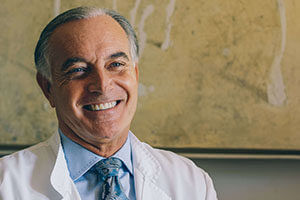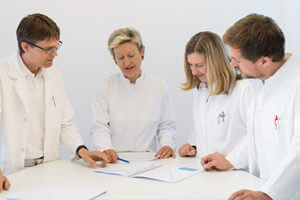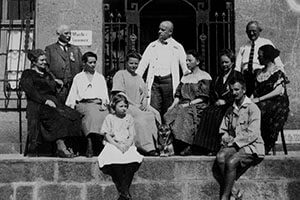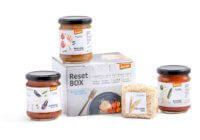Even though it is not what comes to mind in connection with fasting clinic, nutrition is just as important at Buchinger Wilhelmi as fasting itself.
The nutritional concept at Buchinger Wilhelmi is based on 100 years of experience and the latest scientific findings. An interdisciplinary team of doctors, chefs and nutritionists at our clinic on Lake Constance take care of our guests’ culinary wellbeing. To this end, we rely on regional, seasonal and Demeter-certified organic produce. The food is prepared with a focus on retaining as many vital substances as possible so that we can provide our guests with protein, complex carbohydrates, healthy fats as well as vitamins, minerals and micronutrients, according to their individual needs.
We are therefore delighted to announce that we have been certified as a “teaching clinic for nutritional medicine” for the seventh time in a row. This accolade is awarded by the German Academy for Nutritional Medicine (DAEM). Buchinger Wilhelmi one of the few institutions to have belonged to this quality circle ever since the first certifications were awarded in 2001. There are currently only 20 certified “teaching clinics for nutritional medicine” in Germany.
Committee for Nutrition plays a pivotal role
Hubert Hohler, Senior Expert Gastronomy, had been head chef in the kitchen at our fasting clinic on Lake Constance for the past 25 years. He describes the requirements the clinic has to satisfy to be certified as a “teaching clinic for nutritional medicine”. “To fulfil the high standards, the clinic set up a Committee for Nutrition that meets regularly and makes decisions on all important aspects in connection with caring for our patients”, he explains. The committee includes representatives from all departments that deal with nutritional medicine or are involved in compiling, preparing and distributing food: Senior physician Prof. Dr. Tania Welzel from the medical team, Birgitt Bley (head of the nutritionist team) for nutritional science, as well as employees from the kitchen, the nursing team and the clinic’s management. Every year, the individual members of the committee are invited to an audit and interviewed in-depth by DAEM.
Nutritional profile – theory and practice
“To earn certification, we also have to prove that the calculated nutritional content of our dishes corresponds with the actual nutritional content”, says Hohler. The nutritional profile of a dish indicates the amounts of different substances it contains, e.g.:
- Carbohydrates
- Fat
- Proteins
- Vitamins (e.g., A, C, D)
- Minerals (e.g., potassium, magnesium)
Especially in hospital kitchens, it is essential that the calculated nutritional values correspond to those in the food that is served. The macro- and micronutrient content can exceed or fall below the calculated average values for several reasons: The origin, quality and storage of individual ingredients as well as the mode of preparation are just some factors that can change the nutritional profile. For example, water-soluble vitamins are partly destroyed during cooking.
“That’s why we carry out tests to find out how our calculations agree with the nutritional profile of the finished food”, the head chef explains. This involves examining the food served in the clinic over the course of one whole week a year. Samples are taken from each dish, blended, frozen and finally subjected to an analytical in the lab. In this way, we can check whether the nutritional profile agrees with the computed data in practice. However, meeting the requirements for certification is not the only reason for doing this. “For us, it is also an important way of testing ourselves and our processes. It allows us to recognize possible sources of error and improve them if necessary” says Hubert Hohler.
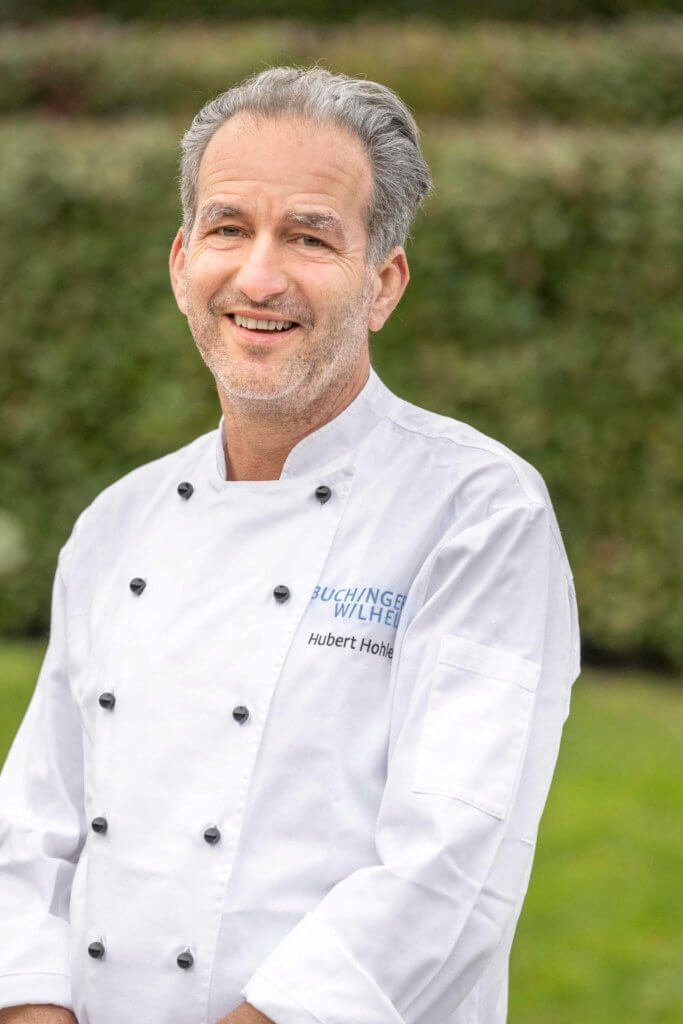
Nutritional advice by experts
The team at Buchinger Wilhelmi also wants to convey to patients how theoretical knowledge and practical implementation correlate. After all, many patients don’t just come to the clinic to fast; they also want to learn how to eat healthily and break bad eating habits.
“What they achieve in two weeks of fasting can unfortunately easily be annulled in the other fifty weeks of the year”, says Hohler. “What’s more, many people are confused by the contradictory information they get from the media. That is where our nutritional doctors, experts and advisers come in: We assume the necessary task of filtering this information for our patients. Our team only passes on the facts in accordance with the latest scientific research. We also present complex nutrition topics in a way that is easy to understand. Our focus is always on our patients, but the wellbeing of animals, the environment and our planet is also important to us. Because all of these factors are essential for a holistic, healthy diet. Equipped with profound knowledge, our patients can then make their own informed decisions about what they want to supply their own body with.”
What role does food play during fasting?
Besides unlimited amounts of mineral water, patients who are fasting are given herbal teas, freshly prepared vegetable consommé and freshly pressed fruit juice – all organic, of course. The fast begins with a light vegetarian meal on the day of arrival, followed by a digestive rest day. After fasting, patients gradually build up their nutrition again – an intense and pleasurable experience that is important for the success of their stay in the clinic in the long term. Those who are unable to fast or choose not to do so can enjoy our ovo-lacto-vegetarian organic gourmet cuisine, or a special diet on request, individually tailored to their health requirements, allergies and personal preferences.
“The food we eat in the days following a fast allows us to build up our intestinal flora in an ideal way. We can reset our microbiome, so to speak, by feeding it with useful bacteria that will keep us healthy later on. That pays off long after the fast is over. Because more than 80 percent of our immune system is in our intestines!” says the nutritional expert.
That’s why it is so important to eat high-quality, easy-to-digest food and beverages after fasting. But what does “high-quality” mean at Buchinger Wilhelmi? In short, it means the best ingredients with an excellent nutritional profile. “Once our vegetarian wholefood diets were ridiculed. Now they are a prime example of healthy nutrition”, says Hubert Hohler.
Three questions to Hubert Hohler, Senior Expert Gastronomy, at Buchinger Wilhelmi on Lake Constance
Why is the certification as a “teaching clinic for nutritional medicine” important for a fasting clinic?
On the one hand, many of our patients want to learn to eat more healthily. We can offer these guests our professional advice and, by doing so, help them find their way through the jungle of information. On the other hand, building up food intake after fasting is elementary for the success of the treatment. We need to know how to make nutritional meals with high-quality nutrients for our patients.
What would you like guests to take away with them after their fast?
That even if our genes are pre-programmed, we can decide for ourselves what environment we want to create for them and how we feed and treat our body. You can get a lot wrong in the fifty weeks after an annual fast, but also a lot right. Get your information on eating healthily from a trustworthy source. That way, you can learn to change bad eating patterns yourself.
What does healthy nutrition mean for you personally?
There must be room for pleasure and health on one plate! Apart from that, eating healthily allows me to keep up my performance, because for the past ten years, I have run one marathon every year.
Youtube videos: Healthy cuisine and recipes from the Buchinger Wilhelmi kitchen




